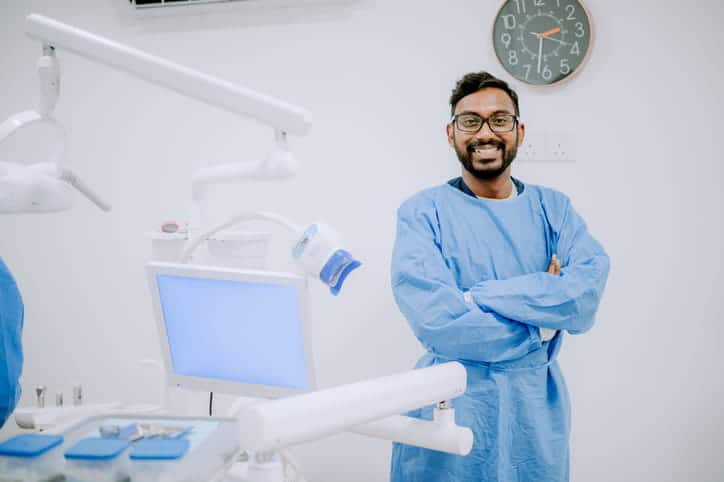
Are Diabetes and Heart Conditions Connected to Oral Health?
The science is clear — oral health is startlingly linked to overall health. The health of your mouth is not isolated from the rest of your body, but is in fact, deeply linked.
Perhaps most concerningly, oral diseases, like gum disease, have been linked to very serious health conditions, such as heart disease, diabetes, and even stroke.
Because oral health is so closely linked with overall health, Absolute Dental offers comprehensive dental care for overall wellness of the whole body. Our incredible staff members, our state-of-the-art technology, and our welcoming environment all work together to ensure the health and longevity of one of your most important body parts.
Today, we’ll be taking a look at the systematic disease dental link, and exploring the connection between oral health and serious conditions like diabetes and heart disease.
Stay on top of your dental health with Absolute Dental. Book an appointment online now.
The Oral-Systemic Health Connection
Your mouth is one of the most important gateways to your body. This is where both food and air enter into your health system from the outside world. Through this orifice, bacteria that are present in the mouth, or enter through the mouth, have an easy pathway to your blood stream.
But the mouth is also a two way street. Many systemic diseases present themselves here first. These can include conditions like lesions, bleeding gums, or even bad breath. Because the mouth is such an important gateway, if something is not working correctly in the body, signs are often apparent here first.
Chronic inflammation of the gums, most notably periodontal disease, has been shown to not stay just in the mouth, but spread easily through the body, causing havoc elsewhere and even contributing to cancer.
In short, poor oral health can cause other diseases in the body, especially in places that may not be immediately apparent, and vice versa.
Link Between Oral Health and Heart Disease
Heart disease and oral health, including the health of your cardiovascular system at large, are closely related. Many studies have shown that poor oral health contributes to serious conditions like heart disease and other cardiovascular afflictions. This can be particularly severe in older adults.
Gum Disease and Heart Health
Gum disease is also known by its more medical name, periodontal disease. This is chronic inflammation in the gums around the teeth. It also progresses in stages. The first is called gingivitis, and is relatively easy to care for. The next stage is periodontal disease, which is characterized by the gums pulling away from the teeth.
If you have any bleeding of the gums during normal activities like eating or brushing your teeth, you should see a dentist right away.
Damage to the heart and cardiovascular system via gum disease happens in two ways. The first is through the method mentioned above — bacteria from the mouth enter the bloodstream, damaging the cardiovascular system over time.
The second is via inflammation. This inflammation doesn’t just stay in the mouth, but can trigger an immune response throughout the body, harming the blood vessels, lungs, and the heart itself.
The science is clear — oral health is heart health.
The Cardiovascular Oral Health Link
Traditional cardiovascular risk factors have included high blood pressure and high cholesterol. However, oral health is now emerging as a newly important one.
Think of properly caring for your teeth and gums as also caring for your heart. Heart health dental care, like brushing twice per day, flossing in the evening, and seeing your dentist every six months, are oral hygiene practices that will do your heart a favor as well as your smile.
Hear From Our Patients
thank u for taking care of my boys :)
I love their Orthodontist office Dr. Askin is a great man great staff as well thank u for taking care…
They make sure you're in no pain when they do teeth fillings
They staff is so caring and they always try and get me in as fast as possible also they make…
Great atmosphere and customer service!
One of the best experience I've have with Absolute Dental. I love the customer service that is given to all…
Give great direction on handling charges and insurance!
I love this place because they are really down to earth. Not stuffy like most medical offices. The staff will…
Same day teeth cleaning and a teeth whitening
I had a toothache, got that taken care of same-day with teeth cleaning and a teeth whitening. If you need…
Great with my kids!
I took my kids here to get a second opinion on some work that needed to be done on their…
Everyone here is really nice and friendly!
My husband and I with our 3 children has been going to this location ever since we moved to Las…
Oral Health and Diabetes
Oral health and diabetes are also intertwined. People with periodontal disease have a higher risk of diabetes, and people with diabetes can have a more difficult time managing oral health.
Why Diabetes Increases Oral Health Problems
Gum disease is a common complication with diabetes. Because of the effects of the disease on the body, gum disease is more prevalent in people with diabetes, and can be harder to manage because of how diabetes affects healing.
The inflammation caused by gum disease can spike blood sugar levels, contributing to diabetes itself, and affecting its management. Elevated glucose levels in saliva and tissues also create a favorable environment for oral bacteria.
Furthermore, diabetes can impact healing in the body, making periodontal disease more difficult to treat once it grabs hold of your gums. Diabetes can also affect the healing process after dental procedures, or if you suffer an injury in the oral cavity.
If you have diabetes, it is critical you care for your oral health so as to break the vicious cycle of gum disease and diabetes.
Common Oral Health Issues for Diabetics
There are a number of common oral health issues that diabetics should be especially vigilant of:
- Periodontal disease and diabetes: Gum disease is the most common and serious oral complication for diabetics. It is often more severe and progresses faster in diabetic patients than those without the disease.
- Tooth decay: Diabetics also have an increased risk of tooth decay due to higher sugar levels in the mouth and reduced saliva flow.
- Dry mouth (xerostomia): Dry mouth is a common symptom among diabetics that can lead to discomfort and increased risk of tooth decay and other oral health problems due to decreased saliva flow in the mouth.
- Fungal infections (e.g. thrush): Fungal infections in the mouth are more prevalent due to compromised immunity in diabetic patients.
- Potential for tooth loss: If periodontal disease is left untreated, tooth loss is possible.
If you have diabetes, it is essential you follow the recommendations of your doctor and your dentist. Diabetes and gum disease especially are a two way street, and caring properly for one will help to care for the other.
Beyond Heart Disease and Diabetes: Other Systemic Connections
In addition to heart disease and diabetes, gum disease and otherwise poor oral health can have an impact on a number of other diseases and conditions, including:
- Rheumatoid arthritis: There are a number of shared inflammatory pathways between periodontal disease and this autoimmune condition.
- Alzheimer’s disease: Emerging scientific evidence suggests a potential link between oral bacteria and brain health.
- Pregnancy complications: Science is also coming to understand the link between gum disease and adverse pregnancy outcomes like low birth weight and preterm birth.
- Respiratory diseases: Oral bacteria can contribute to lung infections.
While much more work needs to be done to completely understand the oral inflammation systemic risk, it is abundantly clear that these conditions contribute to one another and vice versa.
It is also clear that the dental health tips we provide extend beyond just teeth and gums, impacting a wide array of other diseases and health conditions. By following these simple tips, you can significantly reduce your risk of gum disease and therefore reduce your risk for other serious health factors.
Contact us today to book or reschedule an appointment.
We Accept Most Dental Insurance
Absolute Dental is a preferred provider for most insurances, unions, and hotels that include: Aetna, Ameritas, Boon-Chapman, Caesars Palace, Cigna, Delta Dental, Diversified, Geha, Guardian, Harrah’s, HealthSCOPE Benefits, Health Plan of Nevada (HPN), Humana, Liberty, Met-Life, MGM-MIRAGE, Premier Access, The Standard, Station Casinos, Teachers Health Trust, United Concordia, United Healthcare, Venetian, and The Zenith. We also accept Medicaid.
If you do not see your dental insurance listed here, just give us a call to confirm!
No Insurance? No Problem. Try our Smile Saver Program
Every person’s situation is different. If you don’t see your health insurance here, or if you do not have dental insurance, we can help you!
Call us now to discuss your situation and discover what options are right for you.
(844) 8-SMILE-NOW
Protecting Your Overall Health: Your Oral Health Resource Guide
Taking care of your mouth, teeth and gums is taking care of your body. Here are some practical tips for keeping these essential body parts in tip-top shape.
Essential Oral Hygiene Best Practices
- The foundation of good oral hygiene is daily brushing with fluoride toothpaste for at least two minutes, twice a day.
- It is also essential to use dental floss or interdental cleaners daily to remove plaque and food particles between teeth. This is best done at night before bed.
- Regular professional cleanings and comprehensive check-ups are essential to remove plaque as well as assess your overall oral health status. This should be done twice a year (every six months), or as directed by your dentist.
- You may also use mouthwash for reducing bacterial load in the mouth and for freshening breath. However, you should never use mouthwash in place of any of the techniques above.
Lifestyle Factors for Systemic Health
In addition to taking care of the health of your mouth by brushing and flossing, there are a number of lifestyle factors you can improve to increase the level of your systemic health:
- Dietary considerations: Reducing intake of sugary food and drinks will minimize tooth decay risk.
- Smoking cessation: Smoking is a major risk factor for gum disease and other oral health problems. It also has a well-documented negative impact on general health. If you smoke, quitting now will drastically improve both oral and overall health.
- Managing existing health conditions: It is essential you work with healthcare professionals to manage diabetes, blood pressure, and other cardiovascular risk factors.
- Eating fruits and vegetables: The benefits of a balanced diet, rich in vitamins and minerals for strong teeth and gums cannot be overstated. A diet consisting of fruits and vegetables and other whole foods can do wonders for your health.
The Role of Your Absolute Dental Team
Absolute Dental is committed to holistic dental care and an overall wellness approach:
- Our experienced healthcare providers are trained to recognize signs of systemic diseases in the mouth.
- We offer personalized oral health care plans tailored to individual needs, especially for patients with diabetes or heart disease.
- Our advanced periodontal therapy options help manage and treat gum disease.
- We are always able to act as an oral health resource guide, providing education and support for patients to achieve optimal oral health and systemic health.
- We utilize the latest scientific evidence and guidelines from organizations like the American Dental Association.
Debunking Myths About Oral Health and Systemic Conditions
Myth: Dental care is only about preventing tooth decay and cavities.
Reality: It’s crucial for overall health and preventing serious health conditions.
Myth: Gum disease only affects the mouth.
Reality: Gum disease has significant associations with cardiovascular disease, diabetes, and other systemic diseases.
Myth: You only need to see a dentist when you have pain.
Reality: Regular check-ups are essential for early detection and the prevention of both oral diseases and systemic health issues.
We want to emphasize — proactive rather than reactive oral health care is always better. Proactive healthcare will not only save you time, it will save you money and pain down the road.
Call now to schedule an appointment at one of our many convenient locations.
Why Choose Absolute Dental for Your Systemic Health Needs?
At Absolute Dental, we don’t just treat teeth, we care for your overall health. We are experts in the oral systemic health connection, and our healthcare professionals are knowledgeable about the links between oral health and systemic diseases.
We offer personalized treatment and tailored dental care plans that consider your specific health conditions, including diabetes and heart disease. We’re committed to education and empowering patients with the knowledge and dental health tips to make informed decisions.
Absolute Dental is your partner in achieving optimal general health through excellent oral health.
FAQ
Yes, gum disease and diabetes are linked, and treating one can help treat the other, and vice versa.
You should always use a toothpaste that contains fluoride and is endorsed by the American Dental Association.
You should visit the dentist every six months or as directed by your dentist.
It is possible. You should ask your doctor and your dentist for more information on the specific medications you are taking.
The most common early sign of gum disease is bleeding gums when doing normal activities like eating or brushing your teeth. If your gums are bleeding regularly, you should see a dentist right away.
It is possible. You should speak to your dentist for more information.
Diabetes and Oral Health. (2025).
Gum Disease and the Connection to Heart Disease. (2025).
Hoare, A., et al. (2019). Chronic Inflammation as a Link between Periodontitis and Carcinogenesis.





















